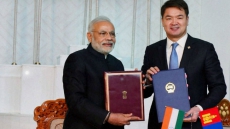EDMONTON — Nearly a decade's worth of data and observation from an environmental group suggests Alberta's fragile backcountry is being damaged by unsustainable off-highway vehicle use.
Ruts deep enough to swallow a man and erosion that has relocated streambeds shows that some areas can't handle motorized traffic even if users do their best to be responsible, says the Alberta Wilderness Association.
"We have photographs of trenches that are so bad that a person is standing at the bottom of it and it's over their head," said Sean Nichols, who runs the association's trail-monitoring project.
"There are some areas where there are three or even four trails parallel because all but the most recent are essentially impassable."
Since 2003, the association has buried traffic sensors at three trailheads connecting about 70 kilometres of designated off-highway vehicle trails in the Bighorn region in the Alberta foothills southwest of Edmonton. The group has also sent teams up the trails to photograph changes.
Its numbers show use has grown significantly. Although traffic dropped in flood years, the number of vehicles on those trails grew from 3,226 in 2007 to 5,544 in 2014.
Monitors also used GPS co-ordinates to document changes and measure the depth and length of ruts. They found many sections where up to 95 metres in every 100 were carved out at least 30 centimetres deep.
The erosion gets so bad it diverts streambeds, said Nichols.
"When the stream gets diverted down the trail, even (conscientious) riders end up driving in the streams because that's where the trail is."
Nichols said the data shows trail use during closed periods has actually declined and signs urging riders to stay on marked trails are largely heeded. The problem, he said, is that these trails — and others like them — are in the wrong place to begin with.
"There are areas where one could reasonably place trail networks and it would have a low impact," he said, adding the Bighorn area problems are common up and down the Alberta foothills.
"Worse in some areas, better in others."
Dave Coutts of the Alberta Off Highway Vehicle Association said the problem stems from increases in ownership and vehicle capability.
"The infrastructure just has not kept up."
He said his group has long sought a provincial network of sustainable and properly engineered trails that will keep the vehicles out of places where they cause damage.
"People have got to learn you can't just go everywhere with these machines."
Coutts said the activity needs to be properly managed by the government.
Ryan Heise of Alberta Environment said the province is dealing with the issue through its land-use frameworks. Two such agreements — including one that covers the Bighorn area — have been hammered out.
"It's a combination of consultation and looking at the cumulative effects of land usage," he said.
"Those marked trails have been developed based on consultation and cumulative effects management. If that's not working out, there may be a need to go back and re-evaluate some of these trails."
But the land-use plans have been a disappointment, said Nichols.
"There still is no access management plan as such, anywhere. We’re still waiting for an actual plan with implementation details, with any kinds of limits."
Nichols said the association has shown its data to Alberta Environment every fall, without effect.
"The first 80 per cent of the meeting is getting the land managers to grudgingly admit that maybe this isn't the right place.
"And nothing ever tends to happen, and we have the same meeting over again."




